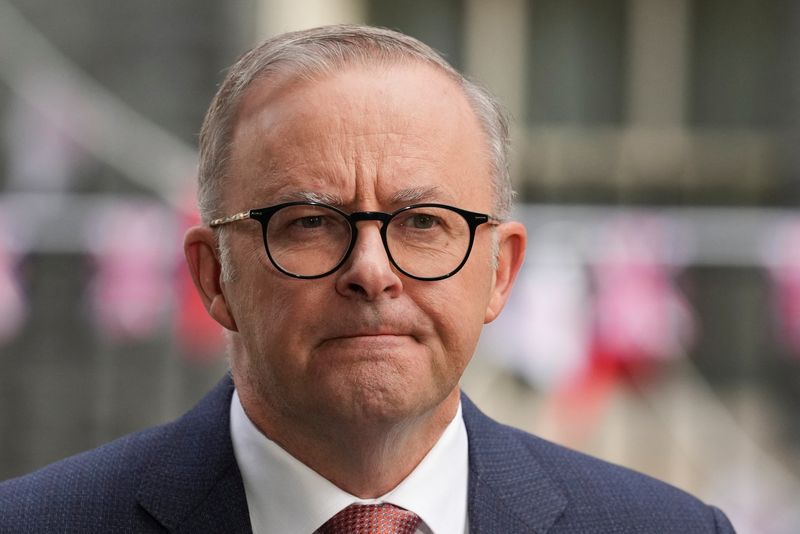Australian government rejects concerns budget may worsen inflation
2023.05.09 21:39

© Reuters. FILE PHOTO: Australian Prime Minister Anthony Albanese looks on as he speaks to the media at Downing Street in London, Britain May 5, 2023. REUTERS/Maja Smiejkowska
By Renju Jose
SYDNEY (Reuters) – Australia’s Labor government said on Wednesday the billions in cost-of-living relief unveiled in the federal budget for families and businesses will not worsen inflationary pressures and put more pressure on the central bank to lift rates further.
Australia on Tuesday boasted the first budget surplus in 15 years after its coffers swelled from bumper mining profits and a strong job market, with unemployment now at near 50-year lows of 3.5%, boosting income tax while curbing welfare payments.
But inflation sits at near 30-year highs of 7.0%, forcing the government to announce relief measures aimed at lowering power bills and easing pressure on consumer prices.
“We wanted to take pressure off families whilst we didn’t put pressure on inflation,” Prime Minister Anthony Albanese told ABC Radio. “We make no apologies for the fact that some of the most vulnerable Australians are people we’re providing assistance for in this budget.”
The budget includes a A$14.6 billion ($10 billion) cost-of-living plan, set to deliver up to A$3 billion in direct energy bill relief for low-income families and small businesses. It also has set aside more money for unemployment allowances and other income support payments.
Treasurer Jim Chalmers brushed aside concerns the support measures could stoke inflation, saying all the relief would not impact the economy at the same time.
“Broadly across the economy, we don’t expect (the support) to be adding to these inflationary pressures,” Chalmers told ABC television, adding some measures will be “actually taking some of the sting out of inflation.”
Chalmers says his budget is restrained on spending, while also giving some relief, after the Reserve Bank of Australia (RBA) last week stunned markets with a rate rise rather than the pause expected by markets.
The RBA has warned that risks to inflation were on the upside given low productivity growth, rising energy prices and a surge in rents.
($1 = 1.4743 Australian dollars)








